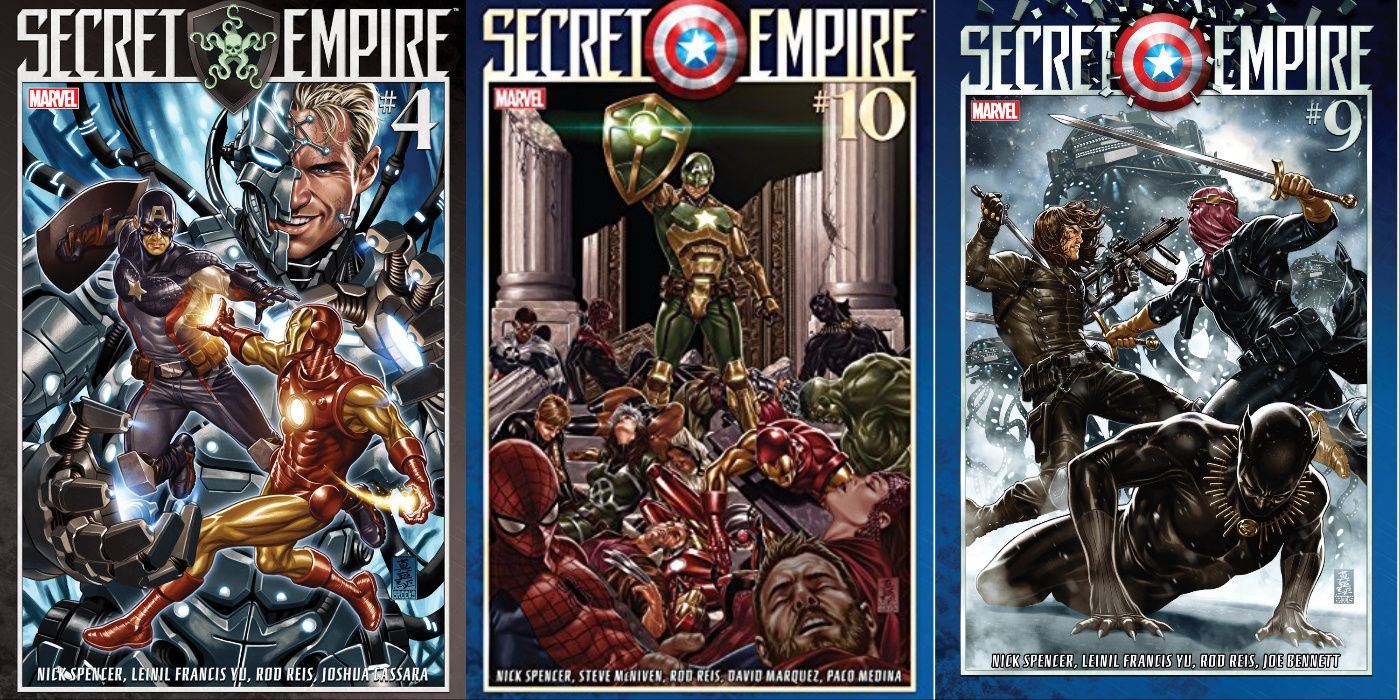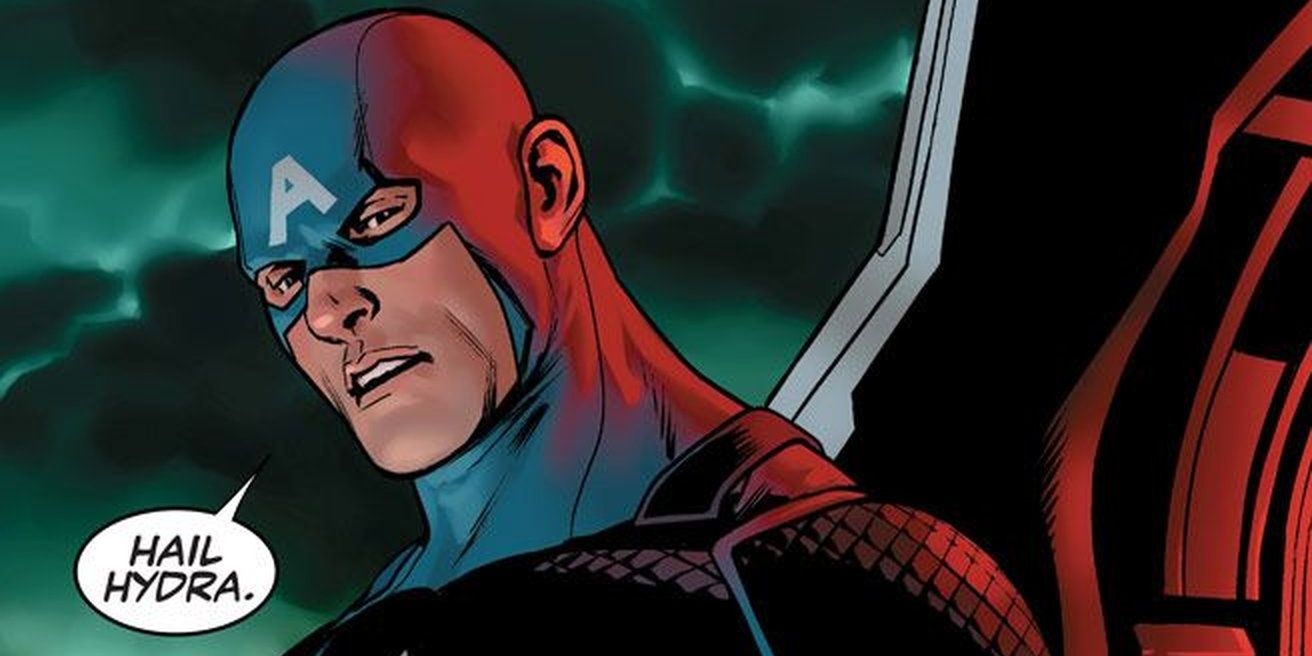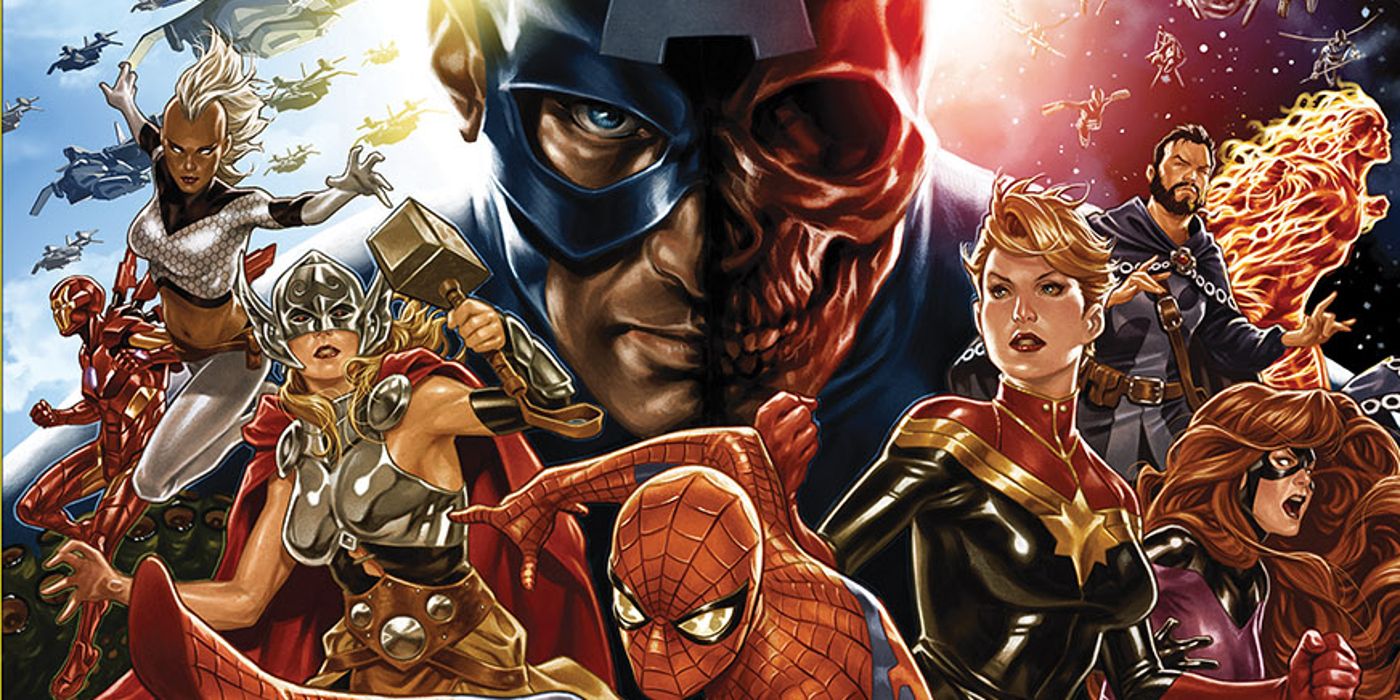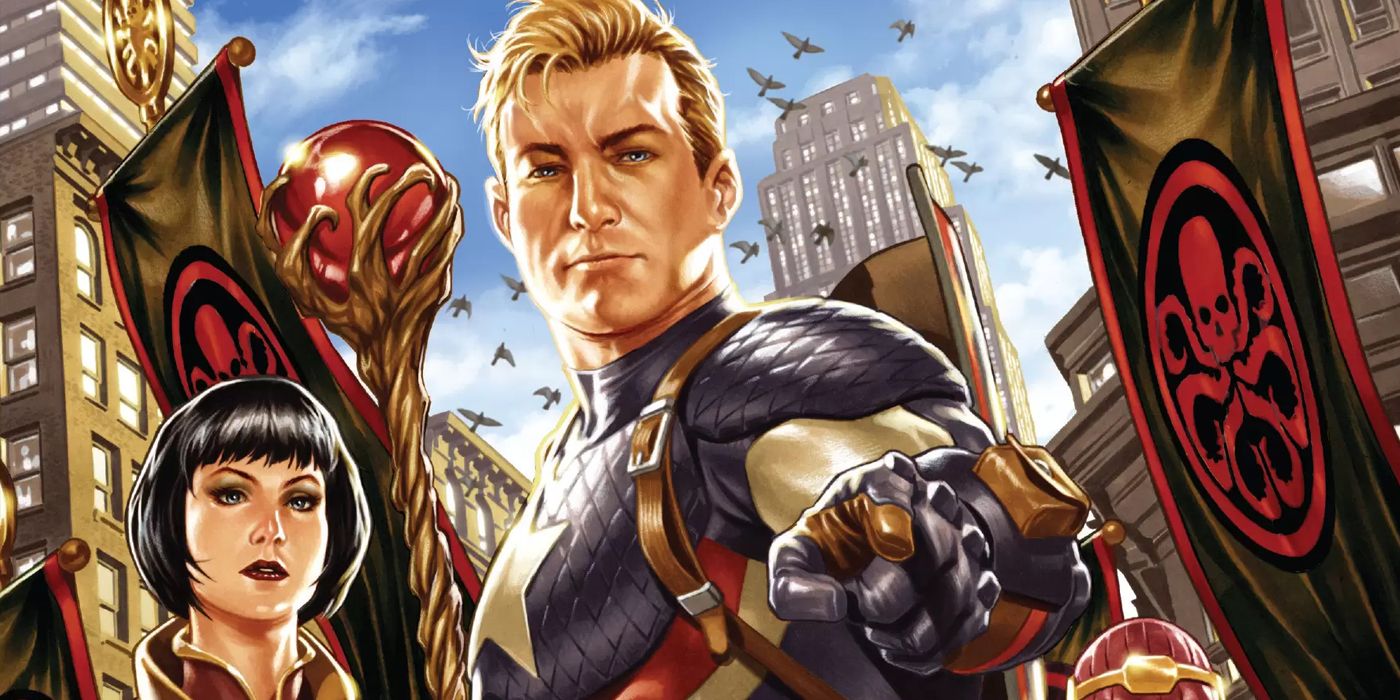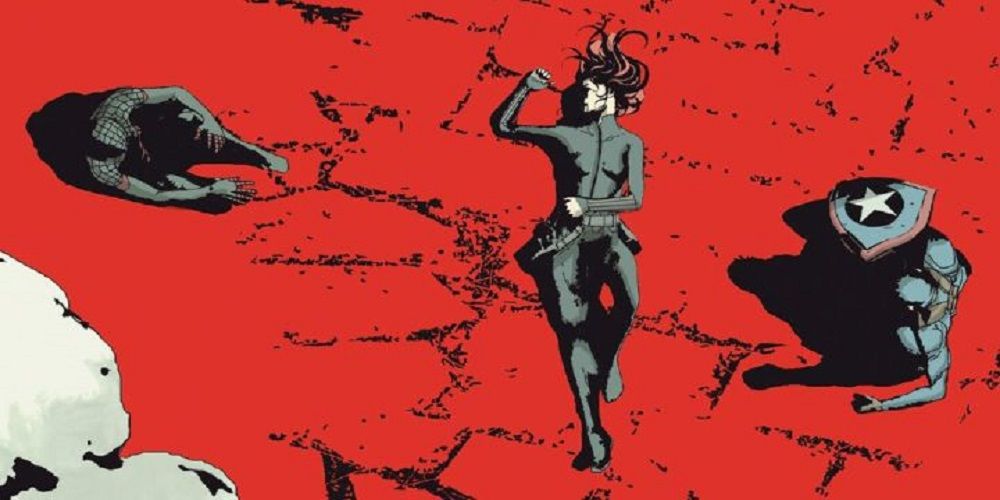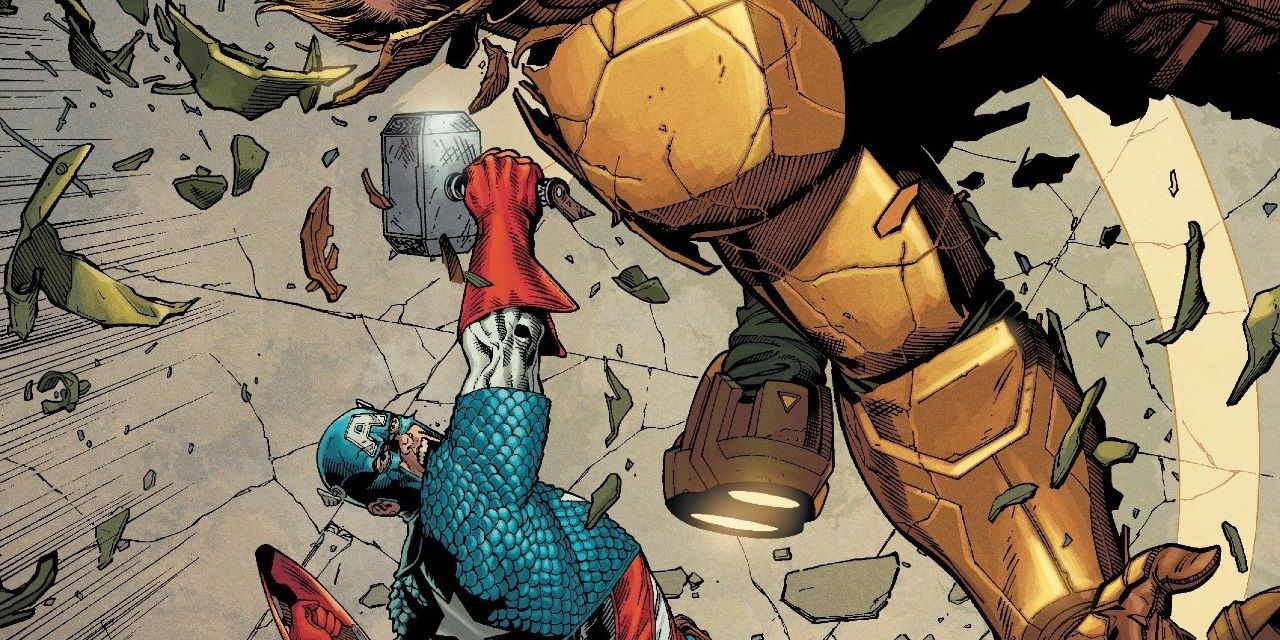Summary
- Secret Empire became of of Marvel's most controversial comic events for exploring a plotline where Captain America was revealed to be a Hydra agent.
- In modern comics, Uncanny Avengers has been tapping into Secret Empire, exploring interesting plot threads in a fresh way.
- While Secret Empire has its flaws, Uncanny Avengers hints that the event may have had more merit than readers gave it credit for.
Secret Empire has a terrible legacy. The event's build-up kicked off in earnest with Steve Rogers: Captain America, a book that launched back in May 2016. This comic dropped a bombshell on readers: Captain America was an agent of Hydra, eschewing freedom and democracy for fascism. The book revealed how all this occurred, including how Rogers took control of SHIELD and enacted a plan that allowed him to take over the United States.
Secret Empire, by writer Nick Spencer and artists Steve McNiven, Leinil Yu, Andrea Sorrentino, Rod Reis, Joshua Cassara, Daniel Acuña, Sean Izaakse, Java Tartaglia, Joe Bennet, David Marquez, Paco Medina, Juan Vlasco, Jesus Arbutov, and Ron Lim, kicked off in 2017, but the book had problems from the start. Secret Empire hasn't aged well, but that's not really surprising. However, recent events in Fall of X's Uncanny Avengers have brought parts of the story back to the fore, which begs the question: is it time to re-evaluate Secret Empire?
The Sentinel Of Fascism?
Captain America is a symbol of the US. Secret Empire and its build-up was meant to subvert that, which actually fit what was going on in American political discourse at the time. However, transforming Captain America into an agent of Hydra felt extremely disrespectful to the legacy of Captain America creators Joe Simon and Jack Kirby, two Jewish creators who made Captain America a statement against fascism and Nazis. Now, the connection between Hydra and Nazis was always there. This mainly came from characters like Red Skull, Baron Strucker, and the original Baron Zemo, all former members of the Third Reich. But it wasn't as overt until Captain America: The First Avenger came out. In the years before that movie, few would have called Hydra a Nazi organization, something the movie established, and the comics followed suit.
Many fans were immediately turned off by the creation of two Jewish creators becoming Nazi adjacent. However, looking back, it's easy to see why Marvel felt like exploring that route. Fascism in the United States was a hot button topic in 2016 and 2017, so it seems like Marvel was making a statement in that direction. Using Captain America to make a political statement is nothing new. In fact, that was the original impetus behind the character. However, many felt that making Cap a Hydra agent wasn't a good choice, despite whatever the book was trying to say about then-current affairs in the United States. This is still one of the main complaints against the comic.
It's often said there's no such thing as a bad idea, just bad execution. Creators in multiple mediums have the leeway to do nearly anything as long as the story is good. The audience can and often will accept anything from creators as long as it's compelling and entertaining. Captain America as a Hydra agent may have been immediately controversial, but if the story was good, that wouldn't have really mattered to anyone. Many comic fans form attachments to their favorite characters, so they can take it personally when creators mess with what they think a character should be. This happened with Captain America, especially when Nick Spencer and Marvel editors said this wasn't an alternate universe version or a clone. The real Cap was an agent of Hydra.
Removed from the controversy of Cap being a Hydra agent, Steve Rogers: Captain America, written by Spencer with art by Jesus Saiz and multiple other artists over its run, is actually good. Taken just from the standpoint of a villainous Captain America story, it had everything a reader could want. Given Captain America is the ultimate strategist, seeing him manipulate events from behind the scenes and using the righteousness Cap has built up over the years to sidestep any complaints works very well. It was often clever, which is what the story needed to be to work. However, the same can't be said for Secret Empire, which suffered from a lot of problems that had become hallmarks of Marvel events.
Not So Secret Problems
Marvel's event cycle had been a series of diminishing returns for a long time when 2017 rolled around. Secret Wars (2015) is the only event of the 2010s that completely delivered on all accounts. One could count House Of X/Powers Of X, which thrived because of the care writer Jonathan Hickman took when building it out. That kind of planning hadn't happened since the halcyon days of the mid '00s that led to Secret Invasion and Siege. Secret Empire got about a year of build, and that year included another contender for the worst Marvel event of all time: Civil War II. Marvel events hadn't looked great in a long time, and there were many traps Secret Empire fell into.
On the one hand, Secret Empire needed more build-up time. Secret Invasion, Siege, and Secret Wars (2015), all had multi-year build-ups in multiple titles across Marvel's line. What made them so great was that Marvel didn't completely telegraph they were going to lead to an event. For example, no one knew that New Avengers: Breakout was going to lead to a Skrull invasion or that the post-Civil War Thor relaunch placing Asgard in Broxton, Oklahoma would play a role in Siege. As for Secret Wars (2015), Hickman was sprinkling in clues to what was going to happen starting in his Fantastic Four run, a full five years before Secret Wars (2015) hit.
Civil War played a role in Secret Invasion. Secret Invasion, Captain America: Reborn, and X-Men/Avengers: Utopia all played into Siege. Secret Ways (2015) had Infinity. These events worked because Marvel took the time to build them up, tailoring their line to complement and support each event.
It can be argued that Civil War II built up to Secret Empire, but that's giving a cash-in event a bit too much credit. Secret Empire's build was more akin to events like Fear Itself or Age Of Ultron, which had very little to no build-up. The fact people didn't like the build-up for ideological reasons didn't help any either. Making Cap Hydra Supreme is a milestone, but it poisoned the well to the extent many people had already turned against Secret Empire before it started. Even something with a rather shallow build-up can grab reader attention. Unfortunately for it, Secret Empire's build-up grabbed the wrong attention. It honesty might have been better for Secret Empire if Marvel would have saved the Hydra reveal until right before the event. This way, readers would've watched Cap manipulating events in Steve Rogers: Captain America and wondered why he was doing this.
Secret Empire also suffered from event bloat. Event books back then felt like excuses to print money. As time went on, Marvel bloated their events books to get bigger sales. Event books started out as seven to eight issues, but then books like Avengers Vs. X-Men and Age of Ultron ballooned to double digit issue numbers a piece. That's a huge difference, especially when taking into account the increased page counts Marvel put into event books. Secret Empire indulges in this tendency and it destroyed any drama in the story. Secret Empire had a Free Comic Book Day special, a zero issue, the ten issue series — which actually wasn't even supposed to be that long, but they added an issue — and an Omega issue. That's thirteen issues all together. That is a massive amount for any event book, made all the worse by how long the issues were.
Among its other flaws, Secret Empire is a torturously slow read. The pacing is terrible, and everything gets milked to the maximum. There are so many plotlines — the McGuffin Cosmic Cube quest, the Hydra plots, the Sam Wilson plots, the Alpha Flight plots, the Black Widow and the teen heroes plots, the resistance base plots, Kobik's dream world with real Steve — and all of them slow the book's pacing down to a crawl. Secret Empire wasn't a simple event story like most Marvel events that came before it, which became another obstacle to its success.
There's nothing wrong with complicated comics. Writers like Grant Morrison and Jonathan Hickman became legends in the industry because of their complex stories. The problem with Secret Empire is that there was nothing interesting about any of the many plots in the book. There were no mind-blowing reveals or unconventional action setpieces. It was just an overly complicated story with a lot of plots. Many arcs weren't interesting at all, but had to be included because that was how the whole thing was built. What makes it worse is that so many of the book's plots don't really matter. For example, at the end of the "Black Widow and the teen heroes" plot, Black Widow abandons the kids to kill Hydra Cap herself, meaning all the pages of her training them are basically pointless.
The pacing and focus on irrelevant details becomes Secret Empire's biggest problem as it goes on. Issue one is pretty compelling, giving readers a glimpse into the US as it is under Hydra and setting up the stakes. However, as the book goes on and Spencer lays plot after plot on the book, it loses all of that. The length and the book's shipping schedule also prevented any one artist from working on the whole. Secret Empire boasts a lot of great artists, but their styles clash. It would be one thing if one artist worked on one plot line. This would make aesthetic sense. Beyond Rod Reis, artists just work haphazardly on the book's many plots. Plus, Spencer never lets Sorrentino, a master of unconventional page layouts, really cook.
Many of Secret Empire's characters do little to advance the excitement or plot. Is it cool to see resistance leader Hawkeye? Yes, and there's some thematic resonance to Hawkeye fighting Cap, going back to their friendly rivalry of the early years. Unfortunately, Secret Empire does nothing with him. Sam Wilson regaining his confidence and putting on the Captain America costume again is cool, but because the book wants a Steve vs Steve fight to end it, Wilson gets taken out of the book right as the endgame begins. Secret Empire introduces cool character ideas, but never pays them off in an interesting or worthwhile way. Throwing in Generations stuff at the end of the book is another mistake, making it feel like Marvel wanted to get two events for the price of one without setting up the second narrative.
Fall Of The Empire
Re-evaluating Secret Empire reveals a story whose problems go beyond just Captain America becoming what amounts to a Nazi. Civil War II is bad, but it has focus. The pacing isn't great, but it can't compare to the multiple problems Secret Empire has. Secret Empire's problems go beneath the surface to the way the book was produced. It likely would've experienced more success had someone pruned it or forced some kind of focus on it. Someone should have said, "Hey, maybe have this artist do this plot and that artist do that one." Someone should have had Spencer hold off on the Cap reveal until just before the story started, so readers would be invested before a controversial plot line turns then off.
Uncanny Avengers is playing off Secret Empire, and it's doing a pretty good job of it because there is a kernel of an interesting idea at the heart of Secret Empire. However, that kernel in Secret Empire never becomes something worthwhile. Secret Empire was meant to grab attention and prod angry readers into buying it. It often feels like it was meant to meant to be divisive. And the sad thing is, it worked. Nearly every Marvel fan has an opinion on it, because of Marvel's "outrage sells comics" strategy. Combined with comic fans' hopes that things will get better down the line, this method works, but it rarely makes comic events great reads.

